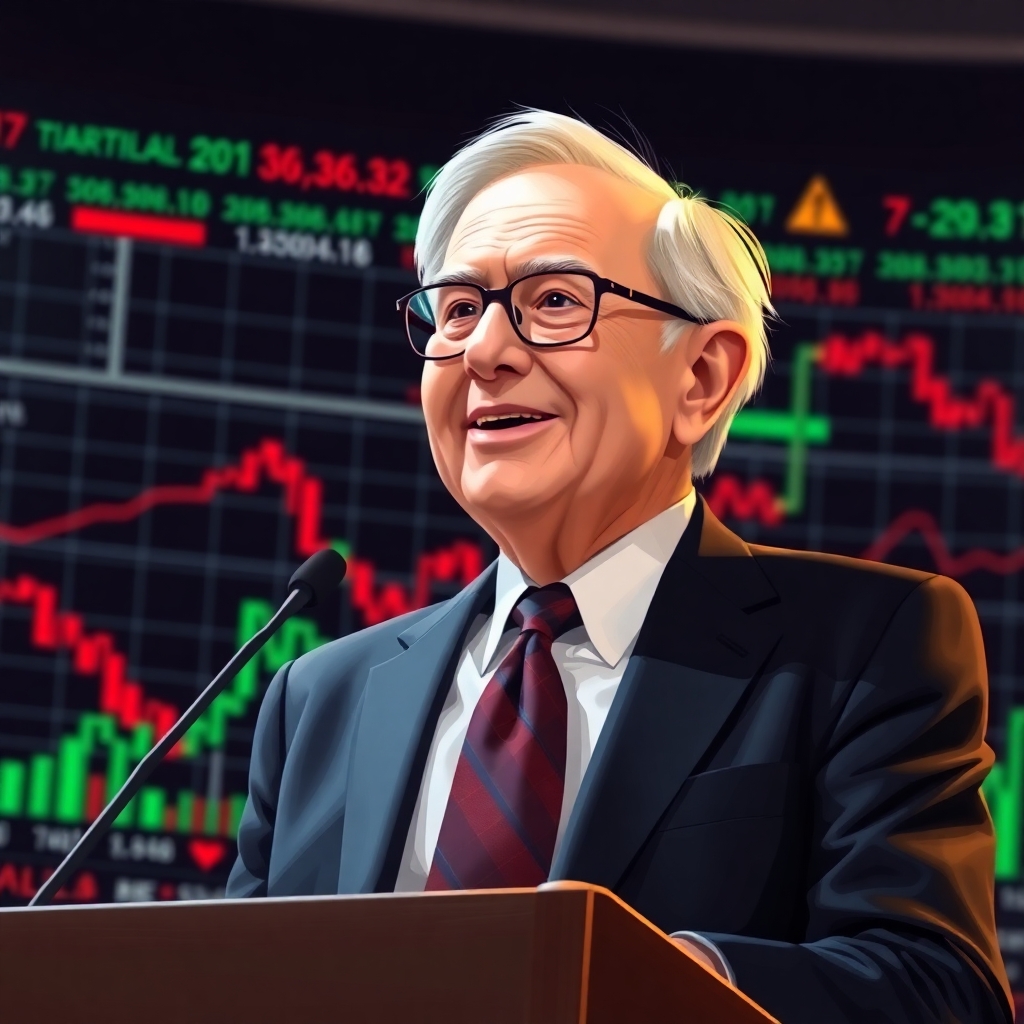Warren Buffett Talks Trade War at Berkshire Hathaway’s Annual Meeting – And the World Leans In
Omaha, Nebraska — In Omaha, where the biggest annual excitement is usually a college baseball game, Warren Buffett once again managed to turn a shareholders’ meeting into something closer to a geopolitical summit. At Berkshire Hathaway’s 2025 “Woodstock for Capitalists,” Buffett stood before thousands of devoted followers and did what markets, pundits, and perhaps even a few nervous finance ministers had been waiting for: he addressed the escalating trade tensions between the U.S. and China, not with bombast, but with that particular Buffett blend of Midwestern plain-spokenness and economic gravity.
The setting was almost absurdly ordinary—an arena better known for hosting basketball games than macroeconomic sermons—but the anticipation was anything but. In an era of algorithm-driven hysteria and leaders who tweet policy before breakfast, Buffett remains the rare voice that investors still describe, without irony, as an “anchor.”
On Trade Wars: Buffett, the Reluctant Preacher
When asked about the latest tariff volleys—the U.S. slapping duties on Chinese semiconductors and EV components, China retaliating by squeezing American farmers—Buffett didn’t hedge.
“Trade wars are lose-lose propositions in the long term,” he said, as if explaining gravity to people still clinging to the flat-earth theory. “They create inefficiencies, raise prices, and generate uncertainty that hampers investment and innovation.”
Buffett’s critique was less fiery condemnation than quiet disarmament. Tariffs might win headlines, but, as he pointed out, they also mean American companies paying more for Chinese parts, and Chinese companies struggling to sell into U.S. markets. The net result? No victors, just shared pain—like a bad divorce where both parties end up poorer and angrier.
He reminded his audience that economic nationalism isn’t exactly new. “This isn’t the first time,” he said. “But betting against the resilience of global trade has never been a winning strategy.” In Buffett-speak, that’s not merely advice—it’s prophecy.
Berkshire’s Own Stakes in the Game
Berkshire Hathaway might be the archetype of an American company, but its portfolio is a quiet map of globalization. Apple, one of its crown jewels, earns huge chunks of revenue in China. Precision Castparts and BNSF Railway depend on global supply chains.
“We do feel the effects,” Buffett admitted. “Costs, shipping delays, planning—it all gets harder when countries start playing tariff ping-pong.”
Still, in classic Buffett style, he turned it into a lesson on resilience: Berkshire’s sprawl—insurance, railroads, energy, candy—acts like a shock absorber. Some businesses wobble, others hold steady. The whole remains improbably, almost annoyingly, solid.
The shadow of Charlie Munger, who died in late 2023, lingered over the stage. Buffett invoked him directly:
“Charlie always said that trade should be seen as a rising tide—not a zero-sum game.”
The absence of that dry Munger wit was felt, but his worldview—practical, skeptical of protectionist chest-thumping—was very much present.
https://www.cnbc.com/berkshire-hathaway

A Message to Policymakers, Wrapped in Politeness
Buffett is no political brawler, but he knows how to lace a warning with charm.
“The United States and China have more to gain from cooperation than confrontation,” he said, adding with surgical understatement: “Decoupling is a fantasy. It would be mutually destructive.”
That “fantasy” line landed like a gavel. He didn’t name names or wag fingers, but anyone listening in Washington or Beijing could hear the subtext: be careful—your policies have consequences that spreadsheets can’t sanitize.
Markets Listen (Because They Always Do)
The reaction was almost ritualistic. Markets, jittery after weeks of tariff headlines, steadied. Berkshire shares nudged upward. Analysts typed reassuring notes.
“Buffett has a way of calming panic,” said Natalie Hsu of HSBC, capturing the essence of what has made him an economic oracle for half a century. His voice doesn’t erase tariffs or rewrite policy, but it tempers the fever—reminding investors that history is long, and fear is fleeting.
Beyond Trade Wars: A Global Sermon
Buffett didn’t stick to tariffs. He zoomed out, in that deceptively casual way of his, to talk about capitalism itself—what’s working, what’s fraying.
“Globalization has lifted more people out of poverty than any economic system in history,” he said. “But it needs to be managed with care, compassion, and a long-term vision.”
It was Buffett at his most reflective: acknowledging that globalization has its losers and that simply “rolling back the clock” isn’t an answer. The challenge, he suggested, is not to abandon global capitalism, but to civilize it.
Conclusion: The Oracle Still Oracles
Buffett’s 2025 address wasn’t a rant, a manifesto, or a stock tip—it was something rarer: a plea for patience in an age allergic to it. Trade wars, he reminded everyone, may be noisy and politically useful, but they’re economically foolish. And foolishness, he implied, is a luxury no superpower can really afford.
In a world where headlines scream and markets twitch, Buffett’s calm voice cut through like an old jazz record in a room full of car alarms.
And his core message—simple, stubborn, and profoundly unfashionable—lingers:
“Peaceful, fair, and open trade is not just good economics—it’s good for the world.”
